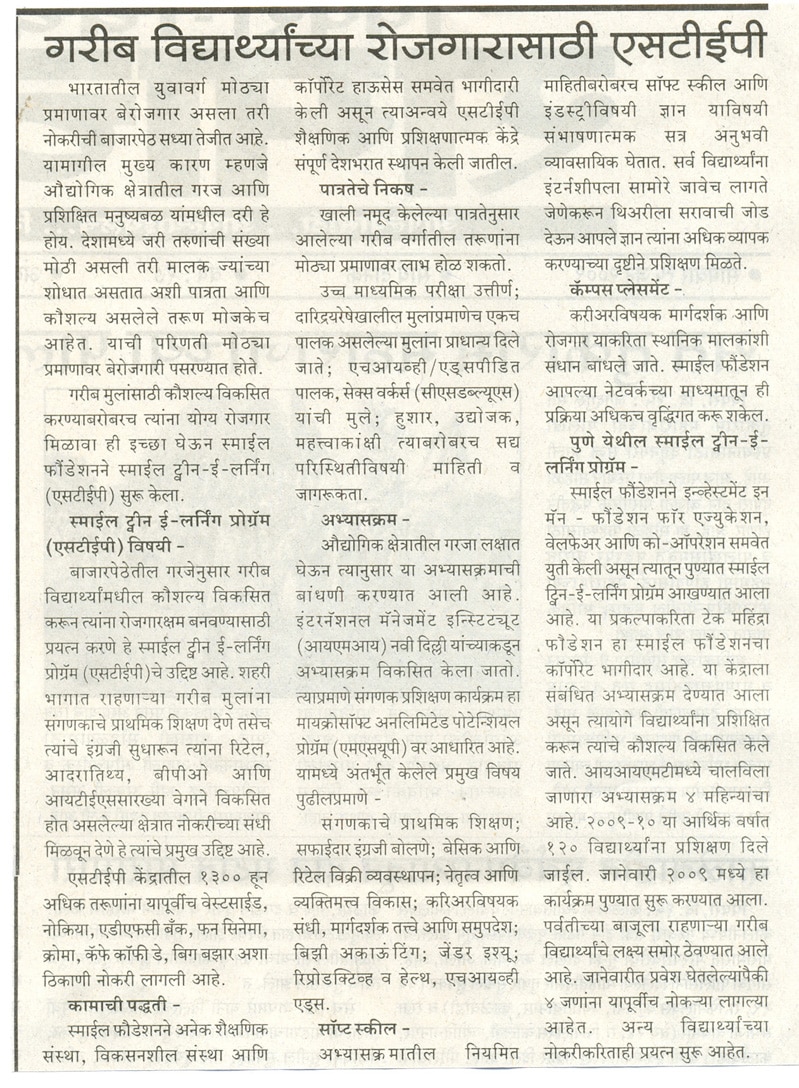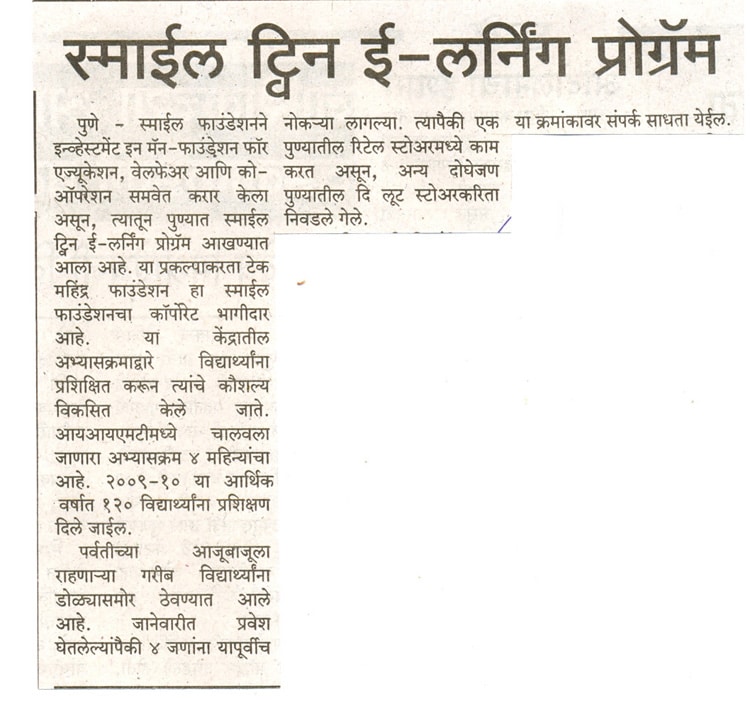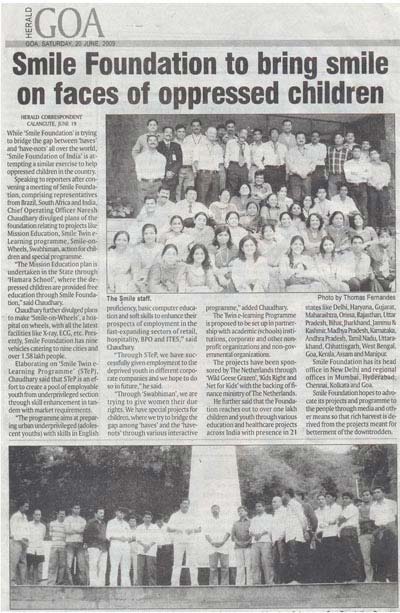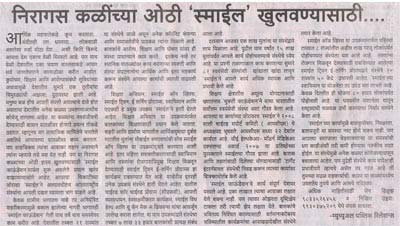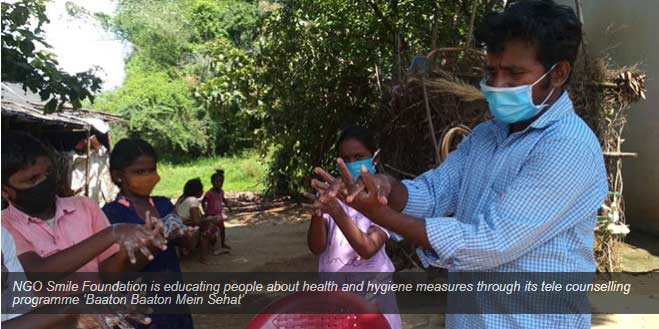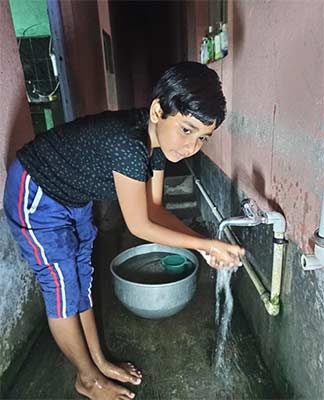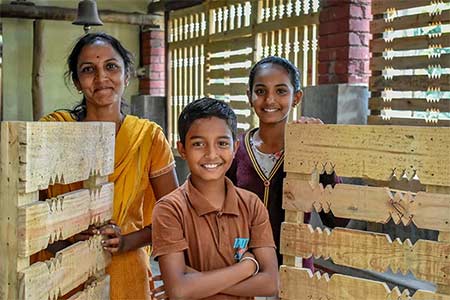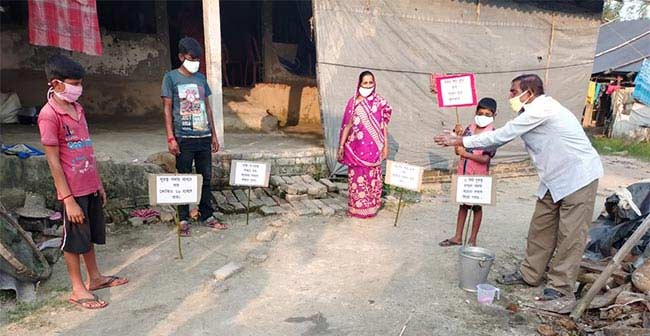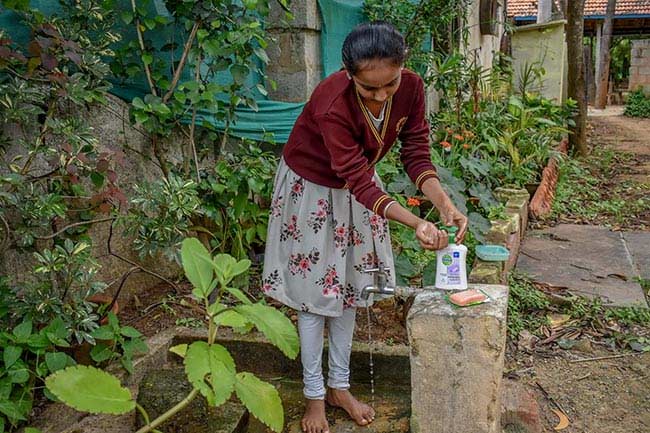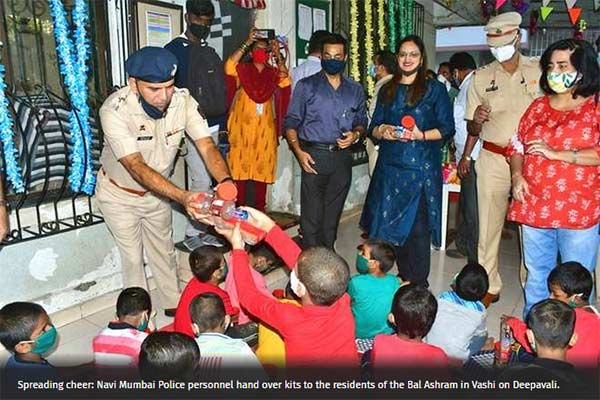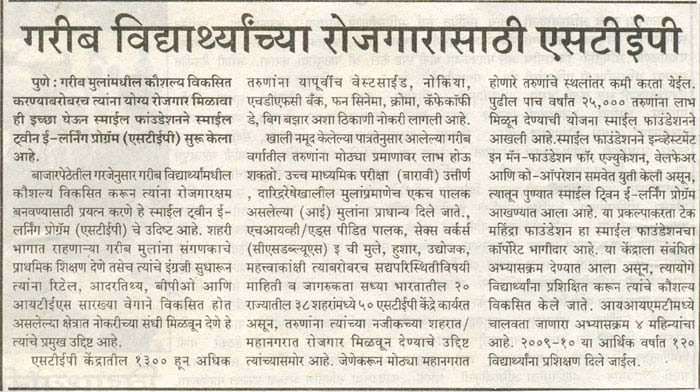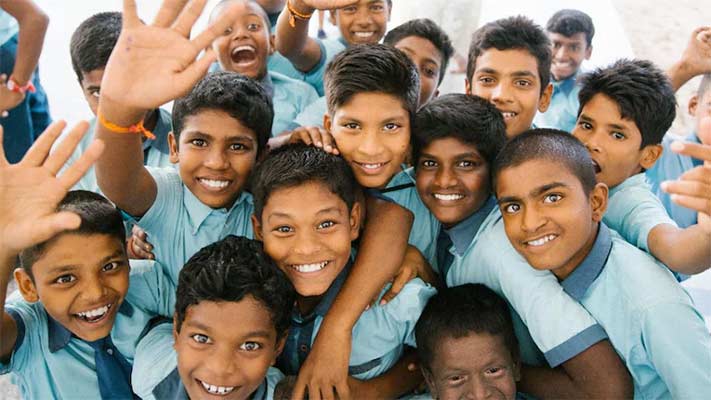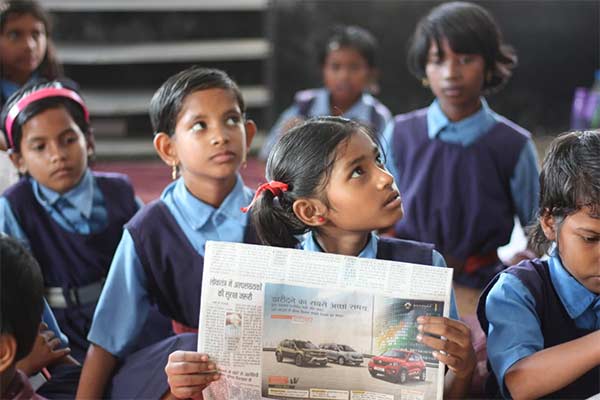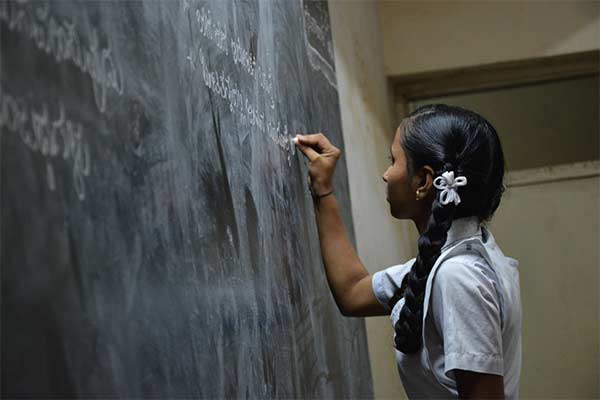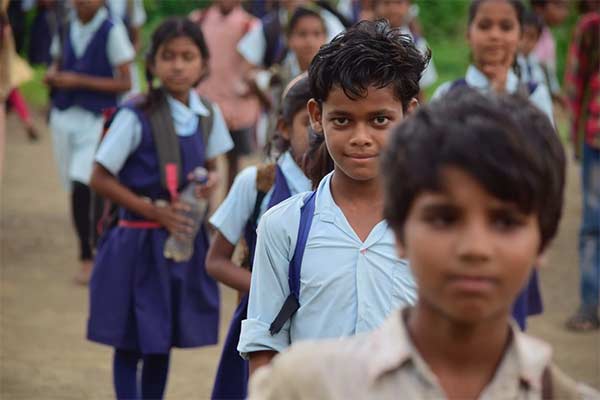Author: Smile Team
Role of content marketing in the times of pandemic
- Post author By Smile Team
- Post date November 4, 2022
- No Comments on Role of content marketing in the times of pandemic
Role of content marketing in the times of pandemic
- Home
- Smile Team
- Page 154
( November 26, 2020 )
Content Jam 2020: Panel discussion on building a strong and a desirable brand through content marketing
The ongoing pandemic has brought about a sea of change in marketing. In the wake of this changed environment, exchange4media’s Content Jam 2020, held on November 25, explored the role that content marketing can play in building a strong brand. The theme of the event was ‘Digital Transformation through Content Transformation’.
A panel discussion was held on building a strong and a desirable brand through content marketing. The panel consisted of Amarpreet Singh, EVP & Portfolio Head (Diageo India) & Board of Director – Royal Challengers Bangalore (RCB); Bhagyashree Navare, Associate Director and Category Head, Kurkure and Cheetos, PepsiCo; Krishnarao Buddha, Sr. Category Head, Parle Products; Nishant Kashikar, Country Manager-India and Gulf, Tourism Australia; Prachi Mohapatra, CMO, fbb, Future Group. The session was moderated by Naziya Alvi Rahman, Editor, exchange4media.
Rahman began the conversation with a question on the role of content marketing in a difficult year for marketers as the pandemic, which has inflicted grief and job loss, has caused stress among consumers leading to a shift in priorities and focus.
Krishnarao Buddha concurred upon the importance of content marketing as brands stuck to their business demands owing to which communication came later.
“There was a lot of ambiguity and confusion in March. The most important aspect to look upon was how to mobilise our business,” he said. He added that once the situation was under control, the focus shifted to connecting with the consumer. “Since shooting was not allowed, creating content in a traditional manner was not an option.”
According to Buddha, under normal circumstances, they would not have been bothered to do as much, but due to the pandemic, they were triggered to think and create content. He cited the example of collating footage from previous commercials stitched by the agency to drive home the message of staying home and staying safe.
Bhagyashree Navare stated that it is an important time to be relevant to consumer’s needs as the consumer expectations from brands have changed drastically.
“I recall a report globally and also in India. Nearly 85 per cent want brands to solve their problems and 80 per cent want them to solve society’s problems. Trust as a factor has gone much higher and is second only to price now,” Navare said.
She said building and maintaining brand trust is very essential at this point of time and it goes beyond building a brand for commercial purposes. “To build brands that speak to society and their needs, we realized that it was important to speak in a way which would establish a deeper connect with the consumers and is true to our core,” she added.
She cited the example of Lay’s and its Heartwork campaign. “Lay’s’ core purpose is to bring joy to people’s lives. This time we thought how we can bring joy to unsung heroes who work hard to bring us what we love while we stay at home,” she added. She also spoke of the collaboration with Smile Foundation to bring hygiene kits to farmers, truck drivers, and people who build our supply chain.
Navare elaborated upon how consumers pay attention to these actions and the importance of speaking to consumers in a meaningful and purposeful manner that is the core of building empathy, trust and a deeper bond with consumers.
Rahman then moved on to ask the panelists about standing out in a crowd when the content being peddled by most brands was laced with human touch and difficult to distinguish.
Kashikar spoke about the tourism category operating in the sea of sameness as everyone has the same beaches, mountains and wildlife.
“We launched a campaign called Restaurant Australia to give the world a chance to experience the culinary culture of Australia. It was inviting people to travel on their belly. Everybody has heard of Masterchef Australia and our association with that show has helped us to raise Australia’s profile as a great culinary destination and the food and wine capital of the world,” he said.
He said that they were able to show how warm and inviting Australians were and how multicultural the country was. Food influencers were also invited to travel to Australia and encouraged to produce content for the same.
He appreciated Byju’s work on its campaigns, especially the Young Genius one. They will scout young talents across the country and recognize them. He also highlighted work done by the brand to help parents and kids learn the implications of New Education Policy.
Amarpreet Singh stressed the need for going back to the basics.
“We look at three Cs from a content marketing perspective: core brand idea; culture; and commitment,” he said. He added the sense of sameness we see is because the cultural tsunami of COVID-19 has hit everybody.
“Knowing your core brand idea and being sharp around that helps in producing best content marketing. Content marketing is not a campaign, it is a commitment. You have to do it for a long period of time because the more you are consistent and the more integrated you are, the greater the ROI,” he said.
He gave the example of Mcdowell’s No. 1 and how it has consistently revolved around the themes of music and friendship. He said that one of the things the brand realized was that men are poor at expressing their feelings so you are not expressing their feelings due to social distancing. “We have a campaign encouraging people to call their friends and thanking them for being there,” he said.
In the end, Rahman asked the members on their views as to how content marketing helps in attaining desired ROI and meeting the objectives.
Prachi said that everyone is chasing an ROI. “Everyone’s budget is constrained at this point and are shrinking. What we have figured out is throwing content first for reach and then following up with smaller campaigns has really worked beautifully for us.”
She said it works for most brands and with a fantastic call to action in the second part, a good ROI is guaranteed. She added that content either has a brand objective or a conversion objective.
“At this point in time, most of us are looking at conversion, and keeping the engagement going is the second part. Every voice you launch into the space has an objective and ROI is a part. Either your brand is being searched more or having a share, conversion looks beautiful to all of us including the management,” concluded Mohapatra.
Twin e-Learning Programme
- Post author By Smile Team
- Post date November 4, 2022
- No Comments on Twin e-Learning Programme
Twin e-Learning Programme
- Home
- Smile Team
- Page 154
(15 June)
Smile Foundation for oppressed Children
- Post author By Smile Team
- Post date November 4, 2022
- No Comments on Smile Foundation for oppressed Children
Smile Foundation for oppressed Children
- Home
- Smile Team
- Page 154
(20 June)
Smile Foundation
- Post author By Smile Team
- Post date November 4, 2022
- No Comments on Smile Foundation
Smile Foundation
- Home
- Smile Team
- Page 154
(22 June)
Under Its ‘Health Cannot Wait’ Campaign, NGO Smile Foundation Is Promoting Hygiene And Sanitation Amid COVID-19
- Home
- Smile Team
- Page 154
( November 23, 2020 )
NGO Smile Foundation has distributed over 1.5 lakh hygiene kits to ensure that along with awareness, vulnerable families also have access to basic hygiene care
New Delhi: “To kill germs and fight Coronavirus, we should wash our hands with soap for 20-30 seconds. While washing hands, we should scrub all surfaces of the hands including the back of hands, between fingers and under nails thoroughly”, explains Samriddhi Pramanik, a student of class 4, from Sundarbans in West Bengal. Before the Coronavirus pandemic, Samriddhi would practice hand hygiene casually and would wash hands before eating, after using a toilet and at other crucial times. However, now, Samriddhi washes her hands more frequently and encourages her family to do the same. Explaining how the family is practising hygiene, one of the COVID precautionary measures, Pradipta Pramanik, Samriddhi’s father said,
“I have elderly parents at home and it is essential for us to protect both ourselves and our parents, who are at a higher risk of contracting the disease, from COVID-19. My younger son looks up to Samriddhi and learns from her. Everyone in the house washes hands more than they used to and wear a mask while going out and always avoid crowded places.
Meet Samriddhi who has adopted handwashing
Similarly, Manjula from Bengaluru, working as a housekeeping staff in a school supported by NGO Smile Foundation, ensures hand washing every hour. She believes by practising hygiene she will not only protect her children but people around her as well. That’s Manjula’s way of contributing to society. Talking about the lessons she learnt on COVID precautionary measures, Manjula said,
“In a community meeting in school, students and we parents were educated about the need for hygiene practices. We also saw advertisements on TV asking people to wash hands, wear a mask and maintain social distance to fight COVID-19.
Meet Manjula and her family who follow COVID precautionary measures at all times
Since the start of the COVID-19 pandemic in India, NGO Smile Foundation is sensitising children studying in its Mission Education centres and their parents on precautionary hygiene measures. Under the ambit of ‘Health Cannot Wait’, Smile Foundation’s health team took up the task of education and information through its tele counselling programme ‘Baaton Baaton Mein Sehat’ and WhatsApp and some of the teachers went door-to-door to do the needful.
Talking to NDTV about the idea and motive behind initiating hygiene and sanitation initiative during the COVID-19 pandemic, Santanu Mishra, Co-founder and Executive Trustee, Smile Foundation, said,
“With the threat of the virus spreading fast it was crucial to orient and communicate to the community especially the children who fall under the vulnerable group, on good hygiene practices to be followed in order to stay protected and safe. The lockdown followed by a shutdown of schools made it difficult to reach out to the children and the families directly, therefore, it was essential to initiate information and education communication initiatives through tele counseling, messages through WhatsApp and centre staff connecting with the community regularly.
Teachers received training online on hygiene and good practices as precautionary measures for COVID-19 and further trained the students and community. Health and well-being sessions were conducted with parents with an objective to orient them about health and hygiene related practices to be followed; social distancing protocols to be adhered to during the pandemic; ensuring emotional and general well-being of their families to navigate the crisis.
Explaining how the team conveys the message, Tapas, working with Smile Foundation as the Regional Officer of East region, said,
“Without getting into the nitty gritties of the disease, we educate the focused group about basic precautions like handwashing. People say they wash hands but not many wash it with soap that too the right way so we demonstrate the 11 steps of handwashing as explained by the World Health Organisation and how soap kills germs. Secondly, we stress upon the use of face masks so as to protect one from droplets.
NGO Smile Foundation teaching the right technique of handwashing
Priyanka, one of the teachers at Mission Education Centre SHED in Kalina, Mumbai said that they mandated the use of face mask even before the nationwide lockdown and restricted the entries of those not abiding by the guidelines. The team also educated students about the symptoms of COVID-19 so that they can communicate with their elders or teachers if they think they have contracted the disease. Talking about the challenges on the ground, Priyanka said,
Young children don’t necessarily understand and adopt the concept of handwashing. We showed video tutorials; how the disease can affect us and at the same time how handwashing can safeguard us. Secondly, often people living in slums don’t adhere to wearing face masks probably because of the lack of knowledge. We went door-to-door to distribute masks and educate on how to wear a mask and how it protects from getting the virus.
Mr Mishra added that the messages were disseminated through skits, posters, and slogans as well.
Deenu Verma, mother of Surabhi Verma studying at one of the Mission Education Centres in Chhattisgarh, informed that during the nationwide lockdown, Smile Foundation team used to counsel over phone and even distributed pamphlets for education purpose. In addition to this, Anjum Khatoon, mother of Mohd Ejaz, a student of Ina Raja Memorial Education Trust in Delhi, said,
“We were provided hygiene kits consisting of soap, sanitizer and masks.
One of the students practising handwashing in the fight against COVID-19
According to Mr Mishra, the initiative ‘Baaton Baaton Mein Sehat’ has reached out to over 60,000 people across India since April 20. In addition to this, the foundation has distributed over 1.5 lakh hygiene kits to ensure that along with awareness, vulnerable families also have access to basic hygiene care. While signing off, Mr Mishra said,
“Through all of this, there is increased awareness among the community members who are now more cautious of their cleanliness, seek medical help timely, ensure their kids do not venture out frequently and have increased practice of good hygiene.
NDTV – Dettol Banega Swasth India campaign is an extension of the five-year-old Banega Swachh India initiative helmed by Campaign Ambassador Amitabh Bachchan. It aims to spread awareness about critical health issues facing the country. In wake of the current COVID-19 pandemic, the need for WASH (Water, Sanitation and Hygiene) is reaffirmed as handwashing is one of the ways to prevent Coronavirus infection and other diseases. The campaign highlights the importance of nutrition and healthcare for women and children to prevent maternal and child mortality, fight malnutrition, stunting, wasting, anaemia and disease prevention through vaccines. Importance of programmes like Public Distribution System (PDS), Mid-day Meal Scheme, POSHAN Abhiyan and the role of Aganwadis and ASHA workers are also covered. Only a Swachh or clean India where toilets are used and open defecation free (ODF) status achieved as part of the Swachh Bharat Abhiyan launched by Prime Minister Narendra Modi in 2014, can eradicate diseases like diahorrea and become a Swasth or healthy India. The campaign will continue to cover issues like air pollution, waste management, plastic ban, manual scavenging and sanitation workers and menstrual hygiene.
The Statesman
- Post author By Smile Team
- Post date November 4, 2022
- No Comments on The Statesman
The Statesman
- Home
- Smile Team
- Page 154
(23 June)
Navi Mumbai Police’s gesture wins praise
- Post author By Smile Team
- Post date November 4, 2022
- No Comments on Navi Mumbai Police’s gesture wins praise
Navi Mumbai Police’s gesture wins praise
- Home
- Smile Team
- Page 154
( November 20, 2020 )
Home Minister appreciates act of providing essentials to unprivileged kids
Maharashtra Home Minister Anil Deshmukh has appreciated the Navi Mumbai Police for distributing food to the residents of the Bal Ashram in Vashi on the occasion of Deepavali.
Mr. Deshmukh tweeted, “The Vashi police personnel from @Navimumpolice showed a nice gesture by carrying an initiative along with Smile Foundation, a social organization to distribute food among the children of the Bal Ashram in Vashi on the occasion of the Diwali festival.”
Deputy Commissioner of Police Suresh Mengade, Assistant Commissioner of Police Vinayak Vast and senior police inspector Sanjeev Dhumal from Vashi had led the initiative.
Mr. Mengade said, “The police department has been involved in social causes amid the pandemic and even before it. While the whole country is celebrating the festival, such kids also need our support to celebrate and each one of us should come forward to help them. The Minister’s tweet is a motivation for us to keep up our good work.”
The Bal Ashram at Sector 28 is run by Desire Society for children living with HIV and has been registered in Hyderabad.
“Of the children in the ashram, 19 are living with HIV, while six others were found abandoned. The smiles on their faces brightened our day too,” Mr. Mengade said. There are children who study from LKG to Class XII. Whatever help that can be extended from our department will be done, Mr. Dhumal said.
Mr. Vast said, “I hope our gesture motivates others too to work for the unprivileged.”
This was the fourth time the Smile Foundation extended the help to the children during the pandemic. “With the prime motive of bringing smiles to children’s faces, we donated supplies like rice and dal, drinking chocolate powder, biscuits, chocolates and stationery items,” Dheeraj Ahuja, founder member of the foundation, said.
“We have extended our help every year, but this year due to the pandemic, we visited them often,” Uma Ahuja, founder president of the foundation, said.
Twin e-Learning Programme
- Post author By Smile Team
- Post date November 4, 2022
- No Comments on Twin e-Learning Programme
Twin e-Learning Programme
- Home
- Smile Team
- Page 154
(23 June)
On Children’s Day, here are a few foundations working for childcare, child rights and education
- Home
- Smile Team
- Page 154
( November 14, 2020 )
Many foundations and NGOs stepped up to bridge the education gap when Covid-19 hit humanity. On Children’s Day, check out a few working for childcare, child rights and education.
Many foundations and NGOs stepped up to bridge the education gap when Covid-19 hit humanity. On Children’s Day, check out a few working for childcare, child rights and education.
HIGHLIGHTS
- The number of children living in institutions in India is 2,38,504
- Many of these children languish in children’s homes without access to basic needs, education and healthcare.
- To address the issues and bridge the gap, many foundations have stood up for the cause, and are truly fulfilling the importance of Children’s Day.
Children are the symbols of the bright future of a country. New energy can be injected into their life only by guiding them on the path of right education, care and progress. There are 132 million orphaned children around the world, and about 20% of them live in India.
As per the National Commission for Protection of Child Rights (NCPCR), the number of children living in institutions in India is 2,38,504. And the total numbers of registered and unregistered CCIs are 5,984 and 1,422 respectively.
There are 8 million children living in institutions around the world (UNICEF). Many of these children languish in children’s homes without access to nutritious food, clean water, quality education, and medical care.
Surprisingly, 80% of these kids have a living family member back home (UNICEF 2015). Most families wouldn’t leave their children in children’s homes if they had the right support to care for them.
To address the issues and bridge the gap, many foundations have stood up for the cause, and are truly fulfilling the importance of Children’s Day. These Non-Profit organisations (NPOs) have come as a blessing for such children and provide the necessary care.
Impact of Covid-19 on children’s education
In India, school closures have impacted 247 million children enrolled in elementary and secondary education and 28 million children who were attending pre-school education in Anganwadi centres. This is in addition to the more than 6 million girls and boys who were already out of school prior to the Covid-19 crisis.
While the government has engaged multiple channels for continuity of education, including web portals, mobile apps, TV channels, radio and podcasts, through platforms such as Diksha, Swayam Prabha TV channels, e-Pathshala and the National Repository of Open Educational Resource, there are many vulnerable children whose education was hit by the pandemic.
Since the government is trying harder to control the pandemic; meanwhile, NGO’s are putting their best to tackle the current scenario and ensure continuity of education and care for children. Here are few of the NGOs playing their part towards the cause:
On Children’s Day, check out a few working for childcare, child rights and education:
1. Miracle Foundation India
Miracle Foundation India is a non-profit organization that works towards bringing life-changing care to orphaned and vulnerable children. With a multi-faceted, collaborative and community-based ‘Child First’ approach, Miracle Foundation India ensures that all these children are educated, healthy and safe.
As part of its commitment to education of vulnerable children, Miracle has ensured enrolment of 100% of their children in school, following which, students go to college.
To ensure continuity in education for children in childcare institutes (CCIs) as well as those who have been sent back home, Miracle Foundation India has increased application of technology online classes/live streaming of sessions/use of smartphones, i-Pads, etc.
2. E-Vidyaloka
The Bangalore-based NGO focuses on imparting education to students of rural government schools in India by crowdsourcing volunteer teachers and connecting them to the schools using the power of IT.
During the pandemic, the foundation is focusing on provide education through remote learning with access to internet and electronics. E-Vidyaloka believes educating kids online will be the way forward in the future.
3. Magic Bus
Magic Bus foundation equips children and young people in the age group of 12 to 18, with the skills and knowledge they need, to grow up and move out of poverty.
The foundation has partnered with Classplus mobile OS for online education to poor kids enrolled in the Magic Bus Livelihood programme. Through the partnership, they will help over 2,000 youngsters across 22 states.
4. Smile Foundation
Smile Foundation provides education to thousands of children from Class I to Class XII running across 23 states.
The foundation found that about 56% of Indian children lack smartphones. In this scenario, amidst Covid-19, they are providing possible solutions to access education.



